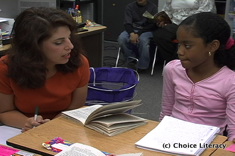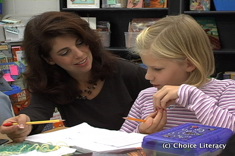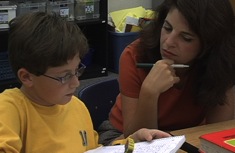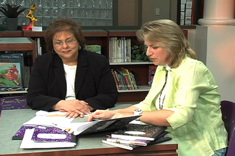It's summer and school is out – at least in Georgia. There are a zillion things I love about the summer: waking up without an alarm, having my morning java out on the front deck, reading books on my front porch, at the pool, at the library, staying up late and watching Letterman every night! The joys of summer…
Sometimes I get the itch to redecorate – or decorate actually. For some reason, I'm afraid to put color on my walls. Afraid I won't like the color in a year or two – afraid it will look terrible if I paint – afraid that the color scheme won't flow correctly. Who ever heard of someone being afraid of color? It's crazy. I'm getting over it – each summer I add more color and decor to my house. At this rate, it will be decorated by the time I pay off the mortgage.
Being afraid is a terrible feeling. I didn't know it at the time, but I used to be afraid to write. It's not that I didn't want to write – I just had nothing to say. I didn't feel that I had anything important to put down. And it's not like I was going to be published someday – so why bother? Yet, I also knew it was important for children to write.
I am a great "faker." My mother still doesn't know how often I was faking being sick and when I really was sick. I faked writing. My first two years of teaching, I used a writer's notebook. I probably filled five or six pages and had dribbles of scribbles here and there throughout the notebook. I'd misplace my notebook in the classroom or just lose it altogether. And to top things off, I'd run out of teaching ideas by January. Now that I think about it, I don't think I fooled those kids. My students didn't write regularly. Kids misplaced or forgot their notebooks. Some days, some weeks we just didn't find the time to write. It didn't really bother me, because I didn't have to confront my fear of writing. What did bother me, however, was having colleagues go on and on about how wonderful writing notebooks in the writing workshop are.
So, I packed up and headed to Columbia's Teachers College for the summer writing institute. It changed my life. I wrote in a notebook – really wrote – for the first time. I had half of it filled in ten days. When I began to reread it, it was nothing more than … cr.. garbage. Nada. Nothing of importance. What happened to that romantic air Lucy Calkins always gave off about writing? The writer determines the importance, and I determined there was none. But, if nothing else, I was determined. I spent the summer writing in that notebook. I wrote every day – some days more than others – and I finished that notebook. I wrote on every page from the beginning to the end. It was an accomplishment. It was still filled with meaningless drivel, but it was my drivel. I did something only someone who writes can do – I finished a notebook.
That's what changed my life – my first notebook. I have since finished many notebooks and I keep them in an old Scholastic book order box. I haul it into school each fall to show my students how hard I work at writing. And I challenge them to do the same. They won't have a whole box of notebooks by the end of the year, but they'll have one – maybe two or three – notebooks filled. They will be a writer before long.
Seven Stories as a Starting Point
To really understand the nuances and rhythms of keeping a writing notebook, you have to have the experience. As teachers, we are busy. We're busy through the whole school year. We finally catch our breath in the summer, and as a profession, we're very protective of that time off. (And so we should be.) Establishing yourself as a writer – one who writes, not necessarily one who publishes – is an accomplishment that no one can take away from you. It will establish a pool of (writing) experiences from which to fish during a conference or while preparing for a mini-lesson. The best way to get notebooks moving in your classroom (or other teachers to implement writer's notebooks) is to keep one yourself.
I read in Jennifer Allen's book Becoming a Literacy Leader where a literacy coach asked the teachers she was working with to write the seven stories of their lives. I found that fascinating and tried it myself. What would be the seven stories I would tell that encompass who I am? If my child or grandchild were to find this notebook, what stories will I want him to know about me? I started it as a list – the seven stories. My list grew and shrank as I kept thinking and rethinking what those seven stories would be. At a workshop, I asked other teachers to try this. One teacher was amazed that all of her stories are sad, but she didn't really think she had a sad life. Another teacher realized her stories were really about her kids and not about her at all. I'm still working on the seven stories of my life. I've written a few of them in my notebook and as I continue to live, the list changes – evolves – and so does my writing.
Maybe summer is the perfect time to start – or recommit yourself to – a writing notebook. All you need is a notebook, a pen or pencil, and your life. Come to think of it, maybe any time is the perfect time to recommit yourself to keeping a notebook!
Aimee's Seven Stories (List of Topics)*
1. Always a teacher – playing school as a child, fishing out ditto sheets from teachers' trash cans, growing up to teach…
2. Snow Globe Memory – sledding with my dad down the middle of the street one snowy night
3. Christmas Staircase – waiting at the top of the stairs
4. The trouble with professors – college prof challenging my belief system
5. Getting married, getting divorced, getting a lesson in life
6. And then came YOU – the day Michael was born
7. Family Ties
*List likely to change as I do…









